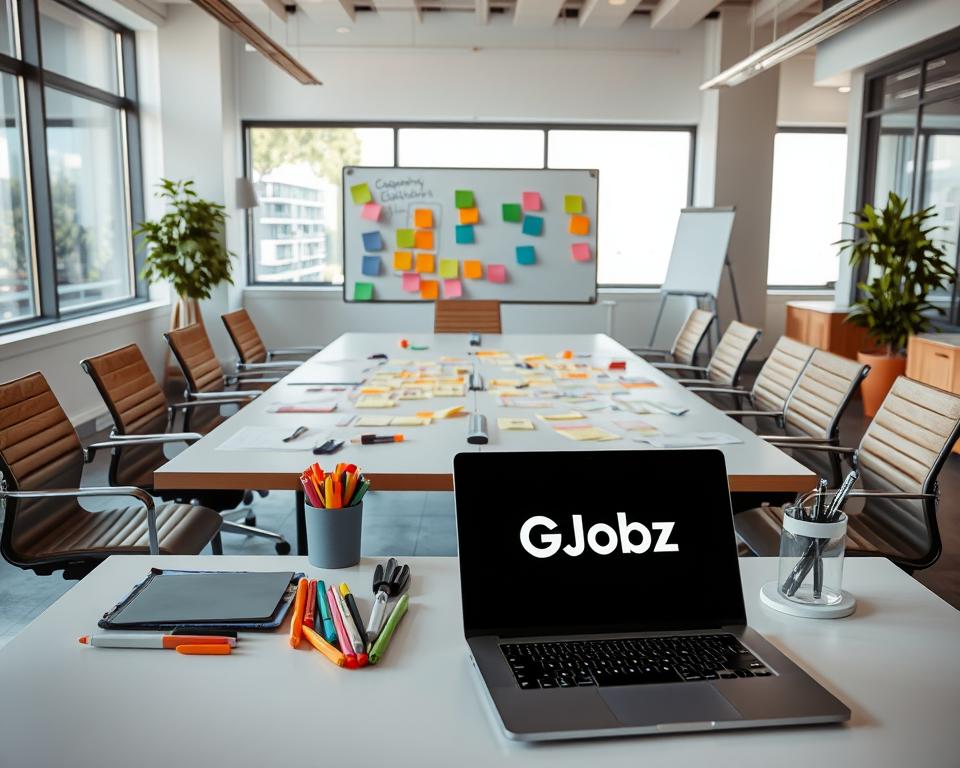
Career Advancement Platforms With Performance Insights
Did you know that 63% of workers leave their jobs due to a lack of development opportunities? This staggering statistic highlights a critical issue in today’s workforce. When employees feel their growth is stagnant, they are more likely to seek opportunities elsewhere.
Another study reveals that 59% of employees feel their employers don’t provide adequate support for their professional growth. This disconnect between employee expectations and organizational support can lead to higher turnover rates and decreased morale.
Modern tools are stepping in to bridge this gap. These platforms focus on enhancing skills and aligning individual goals with organizational objectives. By leveraging data-driven insights, they help employees track their progress and identify areas for improvement.
With the corporate training market growing to $35 billion, it’s clear that businesses are investing in these solutions. Traditional training methods are being replaced by AI-powered tools that offer personalized learning experiences. This shift not only boosts employee satisfaction but also drives better results for organizations.
Key Takeaways
- 63% of workers quit due to lack of development opportunities.
- 59% of employees report inadequate support for professional growth.
- Modern platforms align individual and organizational goals.
- AI-powered tools offer personalized learning experiences.
- The corporate training market is valued at $35 billion.
Introduction to Career Advancement Platforms
Digital ecosystems are transforming how employees and organizations achieve long-term growth. These platforms combine assessments, learning paths, and progress tracking into a comprehensive digital toolkit. Unlike traditional LMS systems, which focus on short-term training, these tools emphasize continuous development and skill enhancement.
Core components of these platforms include skills assessments, personalized learning modules, and mentorship networks. For example, TalentGuard leverages AI-driven workforce intelligence to provide tailored recommendations for employees. This approach ensures that individuals can identify and address their skill gaps effectively.
The market has evolved from static training portals to dynamic ecosystems. Modern platforms integrate seamlessly with HRIS systems, like Deel Engage, to streamline management processes. Mobile accessibility, as seen in Udemy’s app-based learning, has also become a key driver of adoption.
These tools support the 70-20-10 learning model, which emphasizes experiential learning, social interactions, and formal training. Additionally, platforms like iMocha use analytics to help organizations transition into skills-based models. By leveraging data, companies can align individual goals with broader workforce needs.
As organizations prioritize development, performance metrics play a crucial role in measuring progress. These insights enable employees to refine their career pathing strategies and achieve their professional goals.
Why Performance Insights Matter in Career Development
Understanding employee growth requires more than just annual reviews. Companies using performance data see 24% higher retention, proving that visibility into progress drives loyalty. Employees want actionable feedback to refine their skills and achieve their goals.
Traditional annual reviews often fall short. They lack the frequency and depth needed to address skill gaps effectively. In contrast, continuous feedback systems provide real-time insights, helping individuals stay on track. For example, TalentGuard’s analytics reduce manager bias, ensuring fair and objective evaluations.

LinkedIn’s skill endorsements offer another layer of performance data. These crowd-sourced insights highlight competencies that might otherwise go unnoticed. Similarly, iMocha’s AI-driven assessments identify hidden strengths, enabling employees to focus on areas that matter most.
The concept of a performance-insight loop is gaining traction. This approach combines regular feedback with actionable steps for improvement. Tools like Coach.me use habit-tracking metrics to drive behavioral change, making growth a continuous process.
Clear growth paths boost engagement by 59%, according to recent studies. Documented competency records also ensure compliance, making performance tracking a win-win for employees and organizations alike. As businesses adopt these systems, the focus shifts from static reviews to dynamic development.
Top Career Advancement Platforms With Performance Insights
In today’s fast-paced work environment, staying ahead requires the right tools. These platforms empower individuals to enhance their skills and achieve their goals. Let’s explore some of the top options available today.
TalentGuard: AI-Driven Workforce Intelligence
TalentGuard leverages AI to provide tailored recommendations for skill development. Its workforce intelligence tools help identify gaps and suggest actionable steps. With a focus on continuous growth, it ensures employees stay aligned with organizational needs.
Udemy: Self-Paced Learning for Skill Enhancement
Udemy offers a vast library of courses for self-paced learning. From coding to leadership, it covers a wide range of skills. Its mobile app makes it easy to learn on the go, making it a favorite among professionals.

LinkedIn: Networking and Learning Combined
LinkedIn combines networking with learning through its platform. Users can access courses, receive endorsements, and connect with mentors. This dual approach makes it a powerful tool for professional growth.
Coach.me: Personalized Career Coaching
Coach.me focuses on habit tracking and personalized coaching. It helps individuals set and achieve their goals through actionable insights. Its user-friendly interface makes it accessible for all levels of professionals.
iMocha: AI-Powered Skill Assessment
iMocha stands out with its AI-driven skill assessments. It offers over 3,000 tests with a 78% predictive hiring accuracy. Features like multilingual support and anti-cheating protocols make it a reliable choice for organizations.
Key Features to Look for in Career Advancement Platforms
Choosing the right tools for professional growth can make all the difference. With so many options available, it’s essential to focus on the features that truly matter. These tools should align with your goals and provide actionable insights to track your progress.
One critical aspect is skills taxonomy alignment. According to recent data, 68% of HR leaders prioritize this feature. It ensures that individual skills match organizational needs, fostering better development outcomes.

Integration with existing HRIS systems is another must-have. Platforms like Culture Amp unify engagement and development data, providing a holistic view of employee growth. Manager dashboards with coaching prompts also play a vital role in guiding individuals toward their goals.
Mobile-first design is non-negotiable in today’s fast-paced world. Tools lacking this feature can hinder accessibility and limit progress. Additionally, platforms like Deel Engage offer compensation benchmarking, ensuring fair and competitive rewards for employees.
When evaluating tools, consider their reporting capabilities. Predictive analytics offer forward-looking insights, while descriptive reporting focuses on past performance. Both are essential for informed decision-making.
Finally, ROI calculation models help justify the investment. Look for platforms with robust API ecosystems to ensure compatibility with your HR tech stack. These features ensure seamless integration and long-term success.
| Feature | Importance | Example |
|---|---|---|
| Skills Taxonomy Alignment | High | Culture Amp |
| HRIS Integration | High | Deel Engage |
| Mobile-First Design | Critical | Udemy |
| Predictive Analytics | High | TalentGuard |
| ROI Calculation | Moderate | iMocha |
How Career Advancement Platforms Benefit Employees
Employees today are finding new ways to grow and succeed in their roles. Modern tools are transforming how individuals approach their development, offering tailored solutions to meet their needs. These platforms provide actionable insights, helping employees track their progress and achieve their goals.
One of the most significant benefits is faster promotions. Users of these tools report promotions 2.1 times quicker than those who don’t use them. This is largely due to AI-curated learning paths that save time and focus on relevant skills.

Skill mapping also boosts confidence. A recent study found that 74% of employees feel more secure negotiating salaries after identifying their strengths. Platforms like Udemy have shown an average 13% salary increase post-certification, making them a valuable resource for growth.
Lateral movement is another advantage. Skills adjacency mapping helps employees explore new roles within their organization. This reduces job search time and fosters internal talent markets. For example, iMocha helped engineers transition to cloud roles in just five months.
Transparent progression criteria create psychological safety. Employees know exactly what’s expected of them, reducing uncertainty. Whether through self-directed or manager-guided models, these tools ensure continuous engagement and learning.
| Benefit | Impact | Example |
|---|---|---|
| Faster Promotions | 2.1x quicker | AI-curated learning paths |
| Salary Negotiation Confidence | 74% feel secure | Udemy certifications |
| Lateral Movement | Reduced job search time | iMocha case study |
| Psychological Safety | Clear progression criteria | Self-directed models |
How Organizations Gain from Career Advancement Platforms
Organizations are leveraging modern tools to transform their workforce and achieve strategic objectives. These solutions not only enhance individual growth but also drive significant benefits for the business as a whole.
One of the most notable advantages is cost efficiency. Companies using these tools report 31% lower recruitment costs. By focusing on internal mobility, organizations save an average of $2.3M annually. This approach also strengthens the talent pipeline, ensuring readiness for future leadership roles.

Skills-based promotion systems have a profound impact on diversity and inclusion. By focusing on competencies rather than traditional metrics, organizations create fairer opportunities for all employees. This fosters a more inclusive workforce and aligns with broader business goals.
During mergers and acquisitions, competency inventories streamline integration. They provide a clear view of existing talent, reducing redundancy and ensuring a smooth transition. This approach minimizes disruptions and maximizes productivity.
Compliance is another critical benefit. Tools that align with ISO 30401 standards ensure organizations meet regulatory requirements. This not only reduces risks but also enhances the company’s reputation.
Productivity gains are equally significant. Reduced learning curve times allow employees to contribute faster. For example, Boeing’s engineer reskilling program achieved measurable results in just five months, showcasing the potential of these tools.
Finally, the ROI timeline for these platforms is compelling. Most organizations see a break-even point within 6 to 18 months. This makes them a smart investment for long-term growth and retention.
- $2.3M saved annually via internal mobility.
- 57% improvement in succession pipeline readiness.
- Enhanced D&I through skills-based promotions.
- Streamlined merger integration with competency inventories.
- Compliance with ISO 30401 talent standards.
- Productivity gains from reduced learning curve times.
- Typical ROI break-even in 6-18 months.
Implementing Career Advancement Platforms in Your Organization
Successfully integrating new tools into your organization requires careful planning and execution. Involving department heads early can boost the success rate to 73%, ensuring alignment across teams. A structured approach, like AIHR’s 5-phase implementation framework, can streamline the process.
Start with a change management checklist. This includes a clear communication plan and pilot groups to test the platform. Data governance protocols are essential to protect sensitive skill data, ensuring compliance and trust.

Integration playbooks for systems like Workday or SuccessFactors simplify the process. Analyze resistance patterns, especially among tenured employees, to address concerns proactively. A detailed LMS migration checklist ensures content portability and minimizes disruptions.
Manager training is critical, with an average of 4-6 hours required. This ensures they can effectively support their teams. Adoption KPIs, such as a 60% 90-day active usage target, help measure success and guide adjustments.
| Key Step | Action | Outcome |
|---|---|---|
| Change Management | Develop comms plan and pilot groups | Smooth transition and buy-in |
| Data Governance | Establish protocols for sensitive data | Compliance and trust |
| Integration | Use playbooks for Workday/SuccessFactors | Seamless system integration |
| Manager Training | Provide 4-6 hours of training | Effective team support |
| Adoption KPIs | Set 60% 90-day active usage target | Measurable success |
By addressing these needs, your company can ensure a successful implementation. This not only meets organizational goals but also empowers employees to track their progress and achieve their plans.
How Can Performance Insights from Career Advancement Platforms Enhance Employee Development?
Performance insights from career advancement platforms can significantly enhance employee development by identifying strengths and weaknesses. Organizations can leverage data to tailor training programs, ensuring targeted skill acquisition. To optimize this process, many companies now choose to explore platforms for employee growth, fostering a culture of continuous improvement and engagement.
Conclusion
The future of workforce development is being reshaped by innovative tools. With 89% of Fortune 500 companies adopting AI-driven solutions, the demand for these platforms is growing rapidly. Projected to expand at a 19% CAGR through 2030, these tools are essential for staying competitive.
Gen Z’s 78% job-hopping propensity highlights the urgency for organizations to invest in growth solutions. Selecting the right tools requires aligning skills taxonomy, ensuring mobile accessibility, and integrating predictive analytics.
Looking ahead, VR and AR are set to revolutionize development experiences. However, organizations must avoid “set-and-forget” implementations. Continuous updates and AI coaching, like Coach.me’s roadmap, will define the next frontier.
Download our platform evaluation checklist to start transforming your workforce today.